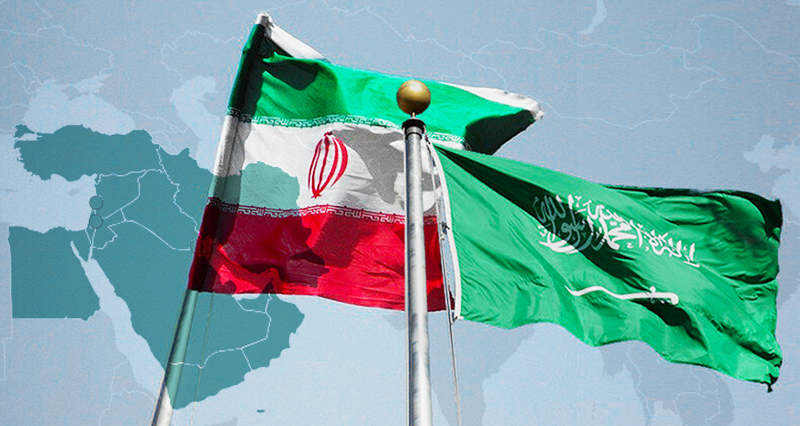The news from the Middle East over the past two years have come as a surprise to many. Once upon a time there was news without introduction about the end of the Arab boycott of Qatar after years of mutual media bombardment, and at other times about a noticeable improvement in relations between Saudi Arabia or the UAE and Türkiye. Then came as well as a remarkable development in relations between Abu Dhabi and the Syrian regime, and at a third time the end of the rivalry between Egyptian President Abdel Fattah El-Sisi and his Turkish counterpart Recep Tayyip Erdogan.
Political coup
All of the above was nothing but setting the stage for the biggest political coup in recent years, which was the sudden announcement in March of an agreement between Saudi Arabia and Iran to restore relations, surprisingly with Chinese mediation.
In my opinion, the agreement is about much more than the mere normalization of relations between the two great powers in the region.
Although many are optimistic that the agreement is in the interest of regional security and facilitates finding solutions to many of the region’s conflicts, it represents a reflection of a political situation that goes far beyond that.
It seems that all parties in the region are arranging their cards in a process of realignment that resembles a gradual departure from Washington’s orbit, to the point of rebellion against its policies and priorities.
Despite the announced American welcoming of the agreement, the Wall Street Journal confirmed the shock of the Joe Biden administration.
The newspaper indicated that CIA Director William Burns informed, during an unannounced visit to Saudi Arabia, Crown Prince Mohammed bin Salman of his frustration regarding the rapprochement between Riyadh and Iran and China’s mediation, as well as the kingdom’s openness with Syria.
Although a few weeks have passed since the agreement, it seems that intense diplomatic efforts are under way to maximize the value of this political achievement.
Normalization with Syria
Regardless of the meeting of the foreign ministers of Saudi Arabia and Iran in China to arrange the restoration of relations between the two countries, there are major diplomatic moves to normalize relations between Saudi Arabia and the Syrian regime.
According to Wall Street Journal, talks took place between Saudi and Syrian officials in Moscow under Russian auspices, with the aim of reaching an agreement to normalize relations between the two countries after years of estrangement following the outbreak of the civil war in Syria, and as a preparation for the reintegration of Damascus into the Arab world.
This process is taking place at an accelerated pace with the aim of unfreezing Syria’s membership in the Arab League and overcoming any objections in this regard.
Recently, the Iraqi ambassador to the Sultanate of Oman hosted his Iranian, Saudi and Syrian counterparts. Egyptian Foreign Minister Sameh Shoukry also hosted his Syrian counterpart, Faisal Al-Miqdad, in Cairo.
Chinese assumptions
All the steps that are being taken are welcome, but it remains important to understand the goals that all parties seek to achieve.
For China, the reasons are economic rather than geopolitical. The Chinese effort for a rapprochement between Riyadh and Tehran is more a preparation for the possibility of war breaking out between Iran and Israel than an attempt to avoid it.
Beijing assumes that the United States and Israel (together or separately) may attack Iran. In case the strike succeeds in destroying the Iranian infrastructure, the Iranian response may be to destroy the oil infrastructure in the Gulf in general, and Saudi Arabia in particular. Such a response would be painful for China, the largest importer of Saudi oil, in case the markets responded by raising the price ceiling.
At the same time, Washington will be the biggest beneficiary of its self-sufficiency, which may be enhanced by the re-launch of shale oil production. Gulf states will be the biggest losers because rebuilding what has been destroyed may take years.
An intended message to Washington
As for Saudi Arabia, it seeks to distance itself and its economy from the dangers of any possible war. At the same time, it is also trying to stop the depletion of its resources, which have been squandered in Yemen, Syria and Lebanon without achieving any of its goals. The Houthis still control Yemen, and Bashar al-Assad is still the president of Syria. In Lebanon, it is powerless to weaken the power of Hezbollah.
Riyadh also sees such an agreement as a blow to the US administration, which takes an intransigent stance towards Saudi Crown Prince Mohammed bin Salman. This step is consistent with the recent development of relations between Beijing and Riyadh and the partnership agreements between them. The kingdom knows the limits of maneuvering with Washington and exploits all available margins without losing the American ally.
While Iran seeks to achieve two goals, the first of which is to catch a breath after its ability to support its allies in the region has become limited in light of its economic suffering under the sanctions. The second goal that Tehran hopes to achieve is that, with such an agreement, it may cause a rift in the US-Israeli-Sunni alliance, and it may neutralize neighboring countries that could support a military strike against it.
Practical difficulties
Although many are counting on the agreement to solve many of the region’s problems in Yemen, Lebanon and Syria, practical difficulties await it.
The agreement may not last long if Washington interferes by destroying it by creating conditions that will restore the clash between the two countries, such as fabricating a Houthi attack on Saudi Arabia or getting involved in targeting Saudi interests in ways that can easily be attributed to those affiliated with Iran.
The language of the agreement’s declaration indicates that it is a cumulative and ongoing process, which means that the parties that broke off their relations in 2016 may face practical tests that may return them to ground zero or clash if the reasons that prompted the agreement fade.
Reconciliation of the weary
In my point of view, the agreement is the reconciliation of the weary in Yemen, Lebanon, Syria and the Gulf states, after events have proven that hot proxy conflicts make it difficult for any party to impose its terms.
The agreement is a truce for all who hope to achieve their minimal goals through political and diplomatic means that force and bullets have failed.
The only way to judge the success of the agreement in the medium term is if it bears fruit:
– Agreeing on a new president for Lebanon and reducing Hezbollah’s dominance in the political scene, without prejudice to its military capabilities.
– Reaching an agreement to share power in Yemen between the allies of Tehran and Riyadh under the auspices of the United Nations.
– Normalization of relations between Saudi Arabia and Syria without challenging the gains that Iran has established for itself there over the past decade.
Despite the difficulties surrounding the path to the success of the agreement, its fastest outcome may be the postponement of reported secret steps to normalize relations between Riyadh and Tel Aviv, for which Israeli Prime Minister Benjamin Netanyahu was pressing hard. In the long term, the success of building trust between all parties may facilitate the building of a regional security system in the Middle East that includes all old adversaries.









Leave a Reply